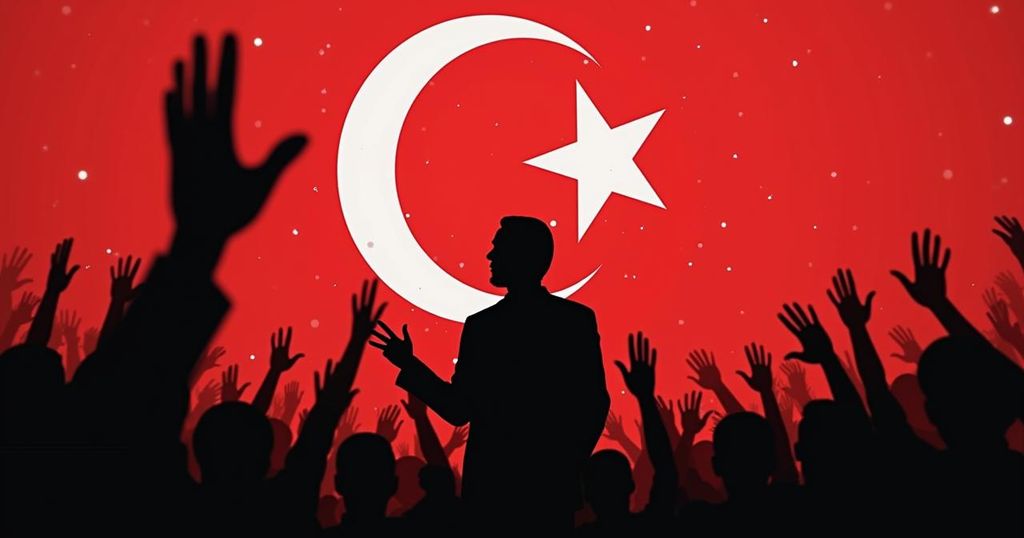Kais Saied Poised for Presidential Re-Election Amid Political Turmoil in Tunisia
Kais Saied is set to win the presidential election with 89.2 percent of the votes as reported in an exit poll, raising concerns over Tunisia’s democratic integrity and governance. Voter turnout was low at 27.7 percent. Saied’s challengers, Zouhair Maghzaoui and Ayachi Zammel, received 3.9 and 6.9 percent of the votes respectively, amid an environment of political repression and economic hardship.
Tunisian President Kais Saied is projected to secure victory in the presidential election with a commanding 89.2 percent of the vote, as indicated by an exit poll released on state television. This election is significant in further solidifying Saied’s authority, which he has exercised following his controversial power consolidation three years ago. The official results will be communicated by the Independent High Authority for Elections of Tunisia (ISIE) on Monday evening. In the recent election, President Saied faced two challengers: former ally and current adversary Zouhair Maghzaoui, leader of the Chaab Party, who garnered 3.9 percent of the vote, and Ayachi Zammel, a businessman imprisoned last month, who received 6.9 percent. Voter turnout was recorded at 27.7 percent, slightly below the anticipated 30 percent, as stated by ISIE spokesman Mohamed Tlili Mansri. Notably, prominent political figures opposing Saied have faced incarceration under various charges and did not endorse any candidates in the election, further complicating the political landscape. Among the imprisoned opposition is Rached Ghannouchi, leader of the Ennahda party, which previously dominated Tunisian politics after the 2011 revolution. Rights organizations have voiced concerns that under Saied’s administration, the democratic advancements achieved post-revolution have been systematically dismantled. Saied, however, has defended his measures as necessary actions to combat corruption and traitorous elements within the political framework. Tensions escalated ahead of the election, particularly when the electoral commission appointed by Saied disqualified three candidates amidst protests. The country is currently grappling with economic challenges, including sluggish growth, rising inflation, and high unemployment, which have triggered public demonstrations. Additionally, lawmakers loyal to Saied have recently curtailed the administrative court’s role in electoral disputes, raising concerns about judicial independence in a country that saw its democratic institutions fundamentally challenged following Saied’s earlier dissolution of the elected parliament and his restructuring of the constitution, which was approved with a mere 30 percent voter turnout. The subsequent parliamentary elections only attracted an 11 percent turnout, raising questions regarding voter engagement and electoral legitimacy.
The political scenario in Tunisia has dramatically altered since Kais Saied assumed the presidency in 2019. Following a series of actions perceived as undemocratic, including dissolving the parliament and rewiring the constitution, Saied’s presidency has been characterized by significant political repression. The emergence of significant opposition figures, such as Rached Ghannouchi, has been stifled through imprisonment, which has raised alarms among civil society and international observers regarding Tunisia’s commitment to democratic principles. With the economic situation deteriorating, the conjunction of political instability and social discontent poses a challenge to Saied’s leadership a few years post-revolution.
In conclusion, Kais Saied is poised to consolidate his power in Tunisia following an exit poll indicating overwhelming support in the presidential election. However, the backdrop of political oppression, economic struggles, and low voter turnout raises profound questions about the health of democracy in Tunisia. As the official results are awaited, the future of Tunisian politics remains uncertain amidst growing international scrutiny and domestic tensions.
Original Source: www.aljazeera.com




Post Comment